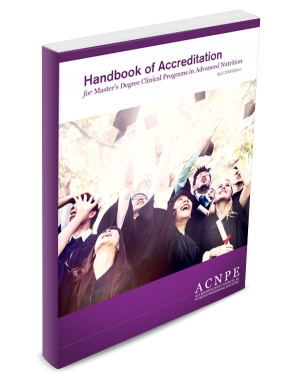Overview of Accreditation Process
ACNPE accreditation enables schools to ensure the educational quality of their programs and promote ongoing improvement -- through a voluntary peer-review process. The Council grants accreditation to master's degree clinical programs in nutrition that demonstrate satsifactory compliance with ACNPE's standards and policies. Applying for ACNPE accreditation is a multi-step process. It begins with submission of the Eligibility Application, demonstrating readiness to seek initial accreditation status. If the Council approves the application, the program will be invited to apply for initial accreditation. Key components of this process include submission of a Self-Study Report and subsequent site visit by the ACNPE team. Once initial accreditation is achieved, the Council periodically reaffirms the program's status.
An institution interested in submitting an Eligibility Application must have students enrolled, at a mimimum, in the first year of the master's degree program. A program whose Eligibility Application has been accepted must have students enrolled in every year of the program at the time of the site visit.
To learn more about the accreditation process for degree programs or to apply for eligibility, see Handbook of Accreditation for Degree Programs, Part Two, Accreditation Process and Part Five, Policy 10, Eligibility Application.
Supervised practice in a clinical setting is a key component of the training of advanced nutrition professionals. ACNPE accredits Supervised Practice Experience (SPE) programs, whether the program is part of an accredited degree program, affiliated with a university that houses an ACNPE-accredited degree program, or non-affiliated with a university. To learn more about the accreditation process for SPE programs or to apply for eligibility, see Handbook of Accreditation for SPE Programs.

Accreditation Essentials
Handbook of Accreditation
Download the Handbook of Accreditation for Degree Programs
Download the Handbook of Accreditation for SPE Programs
